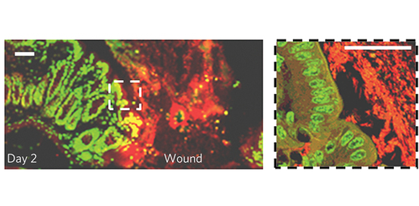Probiotic supplements can protect female mice from the loss of bone density that occurs after having their ovaries removed, researchers at Emory and Georgia State reported a couple years ago.

Roberto Pacifici, MD
This finding, published in Journal of Clinical Investigation, had clear implications for the treatment of osteoporosis in post-menopausal women. Prompted by external emails, Lab Land learned that the Emory investigators are now continuing their research in the clinic.
Endocrinologist/osteoimmunologist Roberto Pacifici and colleague Jessica Alvarez are conducting a double-blind study for women aged 50-65, using VSL3, a widely available and inexpensive dietary supplement. Participants would take the supplement or placebo for a year. More information is available here.
In mice, the loss of estrogen increases gut permeability, which allows bacterial products to activate immune cells in the intestine. In turn, immune cells release signals that break down bone. It appears that probiotics both tighten up the permeability of the gut and dampen inflammatory signals that drive the immune cells. Read more






